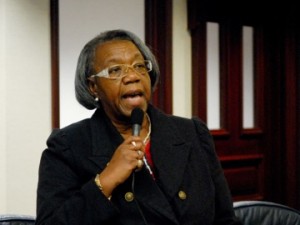Town hall participants warn that Florida is falling behind in creating health insurance exchange
State Rep.
Jul 31, 2020397.7K Shares6.6M Views
During a town hall hosted by Florida health advocates today, policy experts warned that the state is falling woefully behind on plans for a state health insurance exchange program. By law, the state is required to have a fully operational exchange program by January 2013.
Florida CHAIN, a health advocacy group in the state, has been holding hearings with other groups around the state in an effort to educate the public about the progress of the Affordable Care Act in Florida. Anton Gunn, the regional director of the U.S. Department of Health and Human Services, was a member of the panel — alongside state Sen. Eleanor Sobel, D-Hollywood, and state Rep. Gwyndolen Clarke-Reed, D-Pompano Beach.
Karen Woodall of the Center for Fiscal and Economic Policy said the state has done “virtually nothing” to implement a state exchange.
“The only things that have happened here in Florida are the ones that do not require legislative approval,” she explained. “Florida is so far behind.”
Florida is currently leading the legal challenge against the Affordable Care Act. Legislators have used the legal challenge as the basis for their refusal to accept some federal health funds, and for their decision to stall implementation of the law.
The inaction of the GOP-led Legislature and Gov. Rick Scott was a major focus of today’s town hall. One audience member told legislators she felt there has been little education and awareness about the health care reform law.
Florida CHAIN’s Laura Goodhue said her group was “traveling the around the state to talk about the law because it is not happening in Tallahassee.”
“The state is not doing the very basics,” she said.
Members of the panel also pointed out that the Legislature has yet to hold a committee meeting or hearing to discuss the progress of the Affordable Care Act in the state. Despite the Legislature turning back federal health grants tied to the law and dragging their feet on the health insurance exchange, the state still has to follow the law, Gunn said.
“This is the law of the land,” Gunn said. “Everyone needs to remember that.”
According to Gunn, Floridians have already been helped by the law. Young people who have been able to stay on their parents’ insurance plan, for example, have already benefited from the measure.
Gunn also said the state accepted a $1 million “planning grant” for an exchange program. However, officials have yet to use the money. He said that most states have used those grant dollars to “engage in research” on how to set up an exchange. Florida has also not applied for any of the implementation grants available to states creating an exchange program.
The only state that did not accept the planning grant was Alaska.
So far, the only semblance of an exchange program in Florida is Florida Health Choices. According to Woodall, though, the program was never intended to be implemented through the Affordable Care Act.
The state’s plandoes not include key provisions that the federal health law does. For example, Florida’s exchange is open only to small employers, not to individuals like the federal law. The Affordable Care Act also provides subsidies for lower-income individuals to buy coverage through the exchange if they cannot afford it, as well as tax credits to some small businesses that cover their workers. Florida’s law provides neither.
Woodall also says there are certain standard health benefits that insurers in Florida Health Choices would not be required to cover, whereas the federal law has a list of required benefits.
“Florida Health Choices was basically created to allow insurers to reduce their benefits,” Woodall says. “This is not really a viable option, unless it is completely repurposed by the Legislature.” Woodall warns that if Florida continues to do nothing, the state would be forced to cede its authority to the federal government.

Paolo Reyna
Reviewer
Paolo Reyna is a writer and storyteller with a wide range of interests. He graduated from New York University with a Bachelor of Arts in Journalism and Media Studies.
Paolo enjoys writing about celebrity culture, gaming, visual arts, and events. He has a keen eye for trends in popular culture and an enthusiasm for exploring new ideas. Paolo's writing aims to inform and entertain while providing fresh perspectives on the topics that interest him most.
In his free time, he loves to travel, watch films, read books, and socialize with friends.
Latest Articles
Popular Articles
